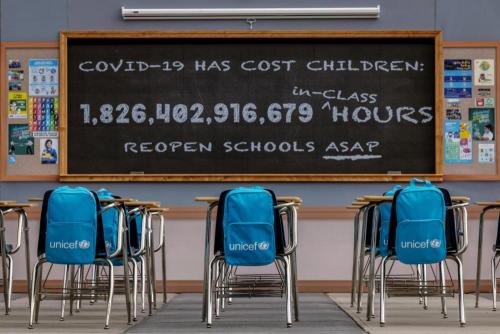
https://www.unicef.org/coronavirus/reopen-schools
We are facing an education crisis. For nearly 77 million children, the pandemic has taken away their classrooms for the past 18 months. Schoolchildren worldwide have lost 1.8 trillion hours and counting of in-person learning due to COVID-19 lockdowns.
The right to go to school and learn is central to every child’s development, safety and well-being. Yet in too many countries classrooms remain closed while social gatherings continue to take place in restaurants, salons and gyms.
This generation of children and youth cannot afford any more disruptions to their education, which is why we’re calling on governments to #ReopenSchools as soon as possible and get education back on track.
“Children should return to in-person learning as soon as possible”
The cost of school closures on students’ learning, health and well-being has been devastating.
The repercussions for every child, their family, their community and their economy will be felt for years to come. Many children will never catch up.
School closures impact every child, but the most vulnerable children hardest.
Some students have been able to access remote learning during school closures, but many of them have struggled due to a lack of support. At least a third of the world’s schoolchildren had no access to remote learning at all.
“At least 1 in 3 schoolchildren had no access to remote learning during school closures”
School closures have led to reduced physical activity and poorer diets, increased levels of anxiety and self-harm, and exposure to domestic violence.
For many children the alternatives to school are child labour, child marriage and teenage pregnancy. Once this happens, it can be impossible for girls or boys to return to school.
Keeping children at home has also resulted in parents having to leave their jobs, especially in countries with no or limited family leave policies.
And this is despite the evidence showing that to date schools have not been a main driver of COVID-19 transmission in communities.
The World Health Organization recommends that it is only in extreme cases that school closures should be considered. And then only as a temporary measure of last resort.
It’s clear: Governments need to prioritize support for schools and take all possible measures to reopen safely.
The future of the next generation depends on it.
“Schools should be the last to close and the first to reopen”
Supported by:
- Educate a Child
- Education Above All Foundation
- The Education Commission
- EEAS-European External Action Service
- European Commission – Directorate-General for European Civil Protection and Humanitarian Aid Operations
- European Parliament intergroup on children’s rights
- Fundación Internacional y para Iberoamérica de Administración y Políticas Públicas (FIIAP)
- Hayata Destek
- The LEGO Foundation
- Swiss Agency for Development and Cooperation
- UNESCO
- UN Girls' Education Initiative (UNGEI)
- The World Bank










Add new comment